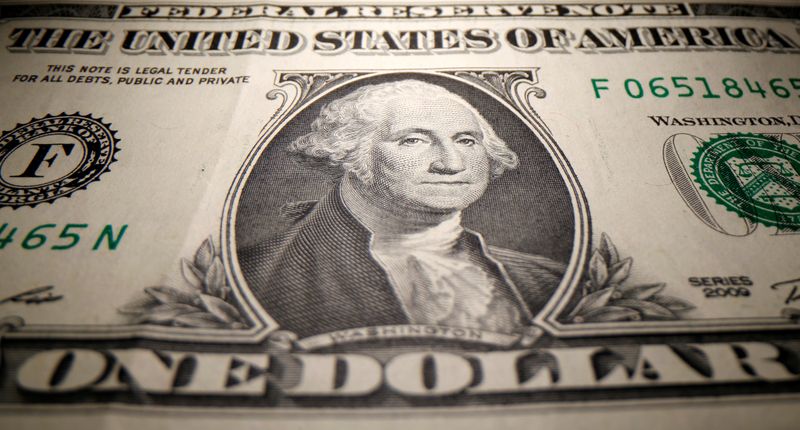By Tom Westbrook
SINGAPORE (Reuters) - The U.S. dollar hung on to most of modest gains made last week, as investors opted for safety on Monday in the face of renewed worries about a second wave of coronavirus infections globally.
The Australian dollar caught a small boost as the head of the country's central bank signalled he was comfortable with the currency's recent rise and said the impact of the COVID-19 pandemic would not be as bad as first feared.
But elsewhere optimism was hard to come by, with the World Health Organization reporting a record increase in global cases on Sunday, while Beijing and Australia's Victoria state have been re-introducing some virus-control restrictions.
The safe-haven yen
Against a basket of currencies (=USD), the dollar held on to small gains won last week and moved marginally lower to 97.571.
"We expect the FX markets to remain caught between recovering economic indicators and concerns about a second-wave of COVID-19 infections in the week ahead," analysts at Barclays (LON:BARC) said in a note.
Barclays said gains in the euro are possible if Purchasing Managers Index (PMI) data due on Tuesday beats expectations and recommended going long on euro/dollar, with a $1.14 target.
The single currency (EUR=) last traded a touch firmer at$1.1194 after dipping to a three-week low of $1.1168 in early trade as divisions among European Union leaders over how to structure a planned COVID-19 recovery fund kept investors wary.
The pound
LOCKDOWNS LINGER
Total global coronavirus cases are now over 8.8 million and focus has been on whether this may lead to fresh lockdowns.
While that is seen as unlikely, localised restrictions have been re-imposed in Beijing, and Australia's Victoria state.
The risk-sensitive Australian dollar
"It's really hard to argue that the Australian dollar is overvalued," Lowe said in a webinar.
But it is also clear that, for now, its surging gains have stalled, along with those of the New Zealand dollar
The kiwi was last 0.2% firmer at $0.6421.
The Reserve Bank of New Zealand announces its latest benchmark interest rate settings on Wednesday. It is all but certain to keep rates on hold at 0.25%, leaving markets to focus on its tone and on talk of negative rates in the future.
"Unlike in Australia, we think the RBNZ's dovishness will blunt any potential (kiwi) strength in 2020," Morgan Stanley (NYSE:MS) analysts said in a note.
Barclays also said it expects continued pressure on the kiwi.
Besides Tuesday's PMI data and German sentiment surveys, investors will also be looking to U.S. consumer sentiment figures out later the same day to gauge whether encouraging signs of recovery from May can be sustained.

A jump in net short bets on the U.S. dollar last week to their highest since 2018 suggests investors are positioned for the world's rapid economic recovery to continue apace - leaving plenty of room for surprises on the downside.